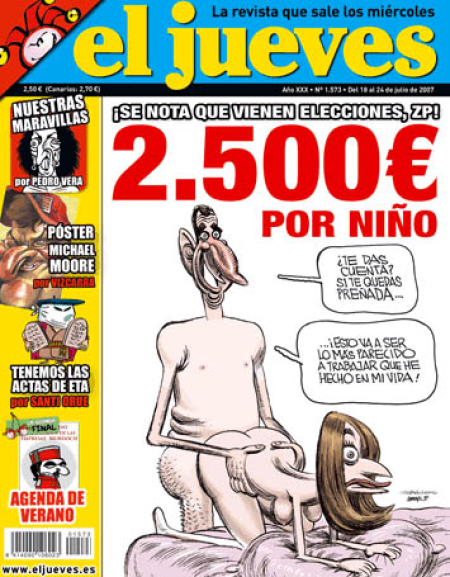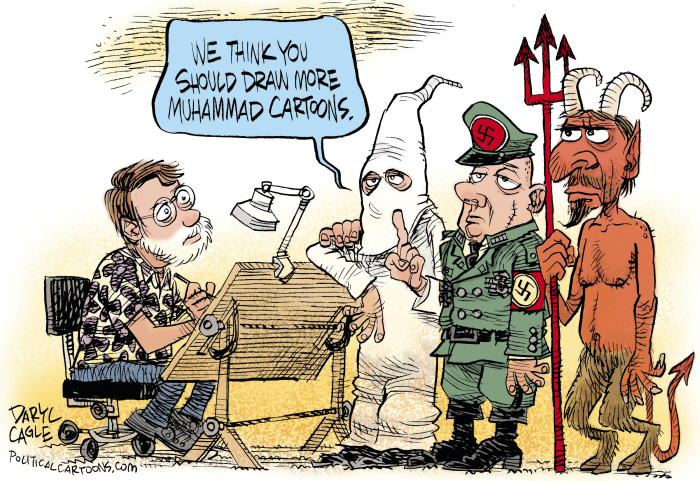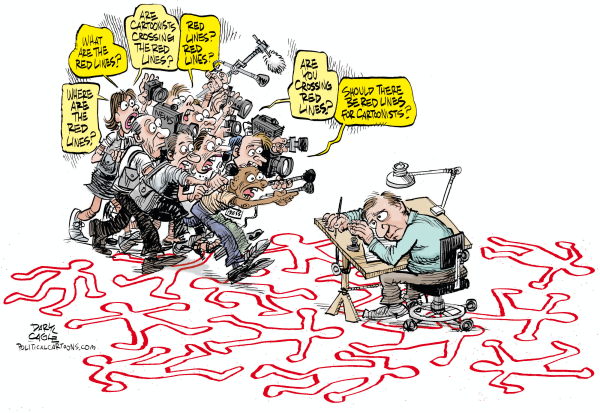
Please use this corrected version of this column and disregard the previous one.
The Spanish humor magazine El Jueves published a cartoon on July 18 that was too much for a Spanish court to stomach. Two days after the magazine came out, a judge ordered police to remove all copies of El Jueves from newsstands and kiosks, the magazine’s Web site was taken down and the court is seeking more information on the cartoonist, who faces a possible two-year jail term.
Soon after the judge’s ruling, the cartoon started appearing all over the Web and was published in other Spanish newspapers as a news story. The Internet buzz was so big that the magazines were often sold out when police arrived at newsstands the next day, to confiscate them. Now the cartoon is a phenomenon, having been seen by many millions of people around the world, rather than just the 80,000 readers of El Jueves. Judges should be careful about what they ask for.
The offending cartoon on the cover of the magazine shows Spanish Crown Prince Felipe having “doggie-style” sex with his wife, Letizia, under the headline, “Obviously Elections are Coming, ZP!” (“ZP” is short for Spanish Prime Minister Zapatero); “2,500 Euros per Child” appears in large red type is above the head of the crown prince, who says to his wife, “Do you realize? If you get pregnant … this will be the closest thing to work I will have ever done in my life!” The headline lampoons a recent initiative by the Spanish government, which would give financial help to couples who have children, in the amount of 2,500 euros or about $3450.00 per child.
Spanish judge Juan Del Olmo wrote that the cartoon was “a clearly denigrating act which is objectively defamatory.” It “is a caricature that affects the honor and the intimate nucleus of dignity of the persons represented by it,” Del Olmo said. “It could damage the prestige of the Crown.”
On their Web site, for a few hours before the site was taken down, the editors of El Jueves made this statement, “We are cartoonists, and we are aware that our work, our duty, and what our readers expect from us is for us to explore the limits of our freedom of expression. We understand that, from time to time, we can even exceed them. That’s life. If we exceed them, that’s what courts are for. But… taking the magazine away? The police going from shop to shop all over the country taking away our magazine? Are we really writing this on July 20th, 2007?”
Part of the judge’s ruling was a demand to find out the identity of the cartoonist, who goes by the single name, “Guillermo.” It is common for cartoonists around the world to use one name, a charming conceit that American cartoonists rarely take advantage of – our celebrities have discovered it though, and it works well for Cher, Madonna, Lassie and Flipper. Guillermo’s full name is Guillermo Torres Meana; he also draws for the Spanish newspaper El Mundo.
In another part of his ruling, the judge demanded that the magazine surrender the “printing plates” that contain the offending cartoon. The judge clearly wasn’t aware that printing plates are not used in modern printing. Guillermo is reported to have said: “They’re going to take the printing plates? Why those haven’t existed for years! The best thing would be for them to cut off my right hand.”
The royal family issued a statement saying that they didn’t ask for the ban. All but one major Spanish newspaper condemned the ban. Al Jazeera showed the cover of the magazine with the racy royals obscured by a black haze. Guillermo’s newspaper, El Mundo, in an editorial commented that the cartoon was “within what is permissible in a society where freedom of expression is a fundamental value.”
The crown prince and his divorcee, TV-newswoman wife have increasingly become the butt of jokes in Spain. El Jueves published a 350 page book of cartoons making fun of the royal family titled, “Tocando los Borbones,” which is a play on the royals’ surname meaning “to be obnoxious,” or that the royal family is obnoxious and the authors will be obnoxious toward them. It may be that the judge doesn’t get out much.
The cartoon kerfuffle in Spain seems more outrageous because it is happening in a modern, EU country where freedom of the press is broadly accepted; but such bans were more common 20 years ago and happened frequently under Spain’s General Franco. In fact, cartoons are one of the best barometers of the freedom of a society; in totalitarian countries cartoonists never think of lampooning their nation’s leaders. Cuban cartoonists never draw Castro. Chinese cartoonists don’t draw their leaders. Don’t even think of drawing the Prophet Muhammad.
When countries teeter on the edge of political freedom the people who test the limits are cartoonists. In recent years: Algerian cartoonist Ali Dilem has been fined and sentenced to jail for drawing his nation’s leaders; South African cartoonist Jonathan “Zapiro” Shapiro is being sued for millions of dollars by an insulted politician; cartoonist Essam Hanafy was jailed in Egypt for insulting the deputy prime minister; cartoonist Paul “Popoli” Nyemb of Cameroon was chased down by goon squads from the government he ridiculed; cartoonist Musa Kart was sued by the prime minister of Turkey who was insulted by being drawn as a cat. There are many more.
Nations, and judges, are best judged by their tolerance of cartoons.
If your newspaper didn’t print the cartoon with this column, you can see it on Daryl Cagle’s blog at www.cagle.com/news/blog. Thanks to Jose Beltran-Escavy for his help with this column. Daryl Cagle is a political cartoonist and blogger for MSNBC.com. Daryl is a past president of the National Cartoonists Society and his cartoons are syndicated to more than 800 newspapers, including the paper you are reading. He runs the most popular cartoon site on the Web at www.cagle.msnbc.com. His books “The BIG Book of Bush Cartoons” and “The Best Political Cartoons of the Year, 2005, 2006 and 2007 Editions,” are available in bookstores now.















